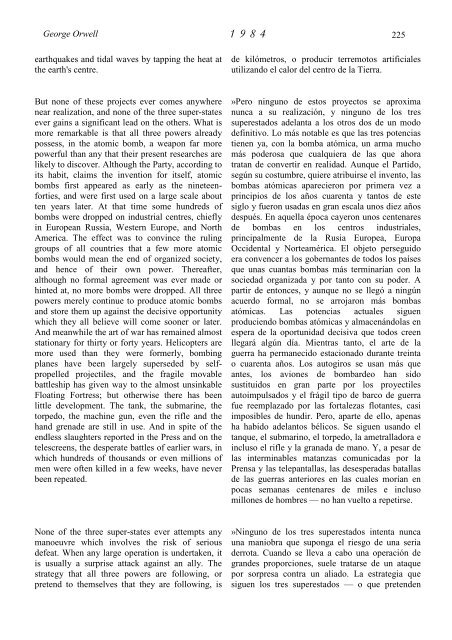You also want an ePaper? Increase the reach of your titles
YUMPU automatically turns print PDFs into web optimized ePapers that Google loves.
George Orwell 1 9 8 4<br />
earthquakes and tidal waves by tapping the heat at<br />
the earth's centre.<br />
But none of these projects ever comes anywhere<br />
near realization, and none of the three super-states<br />
ever gains a significant lead on the others. What is<br />
more remarkable is that all three powers already<br />
possess, in the atomic bomb, a weapon far more<br />
powerful than any that their present researches are<br />
likely to discover. Although the Party, according to<br />
its habit, claims the invention for itself, atomic<br />
bombs first appeared as early as the nineteenforties,<br />
and were first used on a large scale about<br />
ten years later. At that time some hundreds of<br />
bombs were dropped on industrial centres, chiefly<br />
in European Russia, Western Europe, and North<br />
America. The effect was to convince the ruling<br />
groups of all countries that a few more atomic<br />
bombs would mean the end of organized society,<br />
and hence of their own power. Thereafter,<br />
although no formal agreement was ever made or<br />
hinted at, no more bombs were dropped. All three<br />
powers merely continue to produce atomic bombs<br />
and store them up against the decisive opportunity<br />
which they all believe will come sooner or later.<br />
And meanwhile the art of war has remained almost<br />
stationary for thirty or forty years. Helicopters are<br />
more used than they were formerly, bombing<br />
planes have been largely superseded by selfpropelled<br />
projectiles, and the fragile movable<br />
battleship has given way to the almost unsinkable<br />
Floating Fortress; but otherwise there has been<br />
little development. The tank, the submarine, the<br />
torpedo, the machine gun, even the rifle and the<br />
hand grenade are still in use. And in spite of the<br />
endless slaughters reported in the Press and on the<br />
telescreens, the desperate battles of earlier wars, in<br />
which hundreds of thousands or even millions of<br />
men were often killed in a few weeks, have never<br />
been repeated.<br />
None of the three super-states ever attempts any<br />
manoeuvre which involves the risk of serious<br />
defeat. When any large operation is undertaken, it<br />
is usually a surprise attack against an ally. The<br />
strategy that all three powers are following, or<br />
pretend to themselves that they are following, is<br />
225<br />
de kilómetros, o producir terremotos artificiales<br />
utilizando el calor del centro de la Tierra.<br />
»Pero ninguno de estos proyectos se aproxima<br />
nunca a su realización, y ninguno de los tres<br />
superestados adelanta a los otros dos de un modo<br />
definitivo. Lo más notable es que las tres potencias<br />
tienen ya, con la bomba atómica, un arma mucho<br />
más poderosa que cualquiera de las que ahora<br />
tratan de convertir en realidad. Aunque el Partido,<br />
según su costumbre, quiere atribuirse el invento, las<br />
bombas atómicas aparecieron por primera vez a<br />
principios de los años cuarenta y tantos de este<br />
siglo y fueron usadas en gran escala unos diez años<br />
después. En aquella época cayeron unos centenares<br />
de bombas en los centros industriales,<br />
principalmente de la Rusia Europea, Europa<br />
Occidental y Norteamérica. El objeto perseguido<br />
era convencer a los gobernantes de todos los países<br />
que unas cuantas bombas más terminarían con la<br />
sociedad organizada y por tanto con su poder. A<br />
partir de entonces, y aunque no se llegó a ningún<br />
acuerdo formal, no se arrojaron más bombas<br />
atómicas. Las potencias actuales siguen<br />
produciendo bombas atómicas y almacenándolas en<br />
espera de la oportunidad decisiva que todos creen<br />
llegará algún día. Mientras tanto, el arte de la<br />
guerra ha permanecido estacionado durante treinta<br />
o cuarenta años. Los autogiros se usan más que<br />
antes, los aviones de bombardeo han sido<br />
sustituidos en gran parte por los proyectiles<br />
autoimpulsados y el frágil tipo de barco de guerra<br />
fue reemplazado por las fortalezas flotantes, casi<br />
imposibles de hundir. Pero, aparte de ello, apenas<br />
ha habido adelantos bélicos. Se siguen usando el<br />
tanque, el submarino, el torpedo, la ametralladora e<br />
incluso el rifle y la granada de mano. Y, a pesar de<br />
las interminables matanzas comunicadas por la<br />
Prensa y las telepantallas, las desesperadas batallas<br />
de las guerras anteriores en las cuales morían en<br />
pocas semanas centenares de miles e incluso<br />
millones de hombres — no han vuelto a repetirse.<br />
»Ninguno de los tres superestados intenta nunca<br />
una maniobra que suponga el riesgo de una seria<br />
derrota. Cuando se lleva a cabo una operación de<br />
grandes proporciones, suele tratarse de un ataque<br />
por sorpresa contra un aliado. La estrategia que<br />
siguen los tres superestados — o que pretenden


